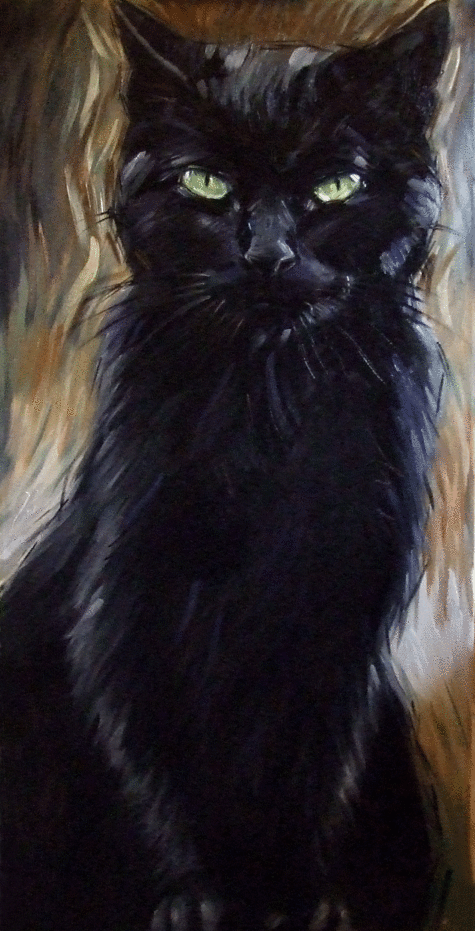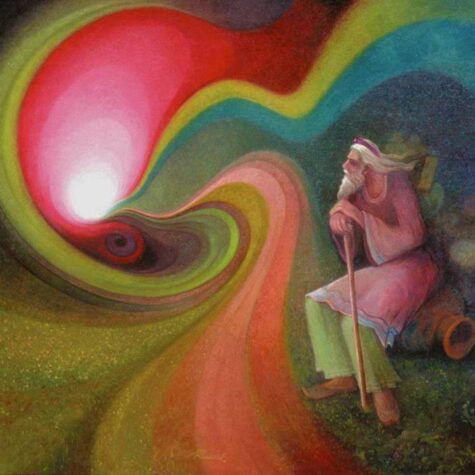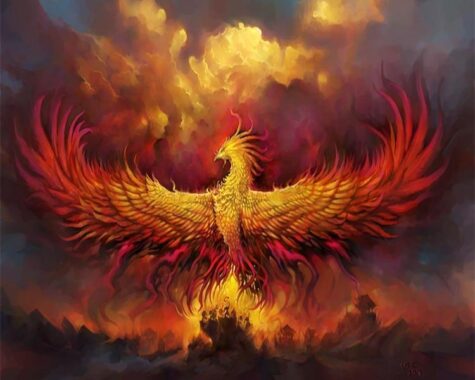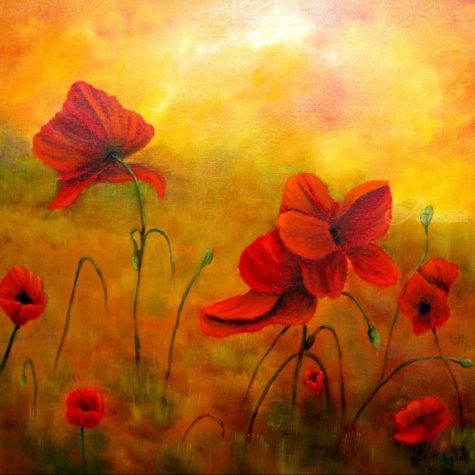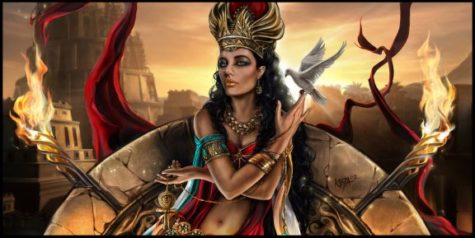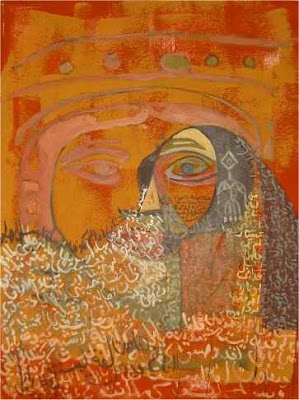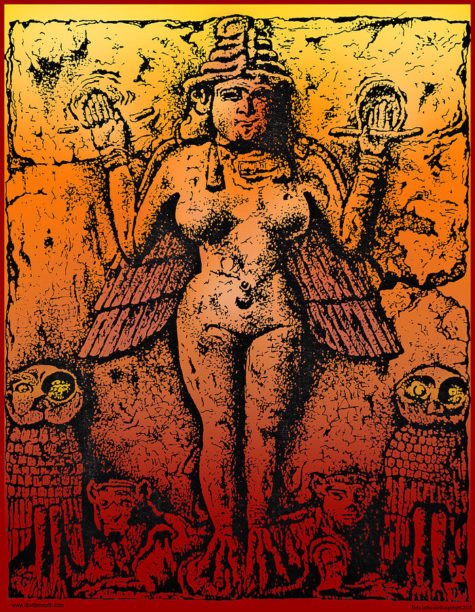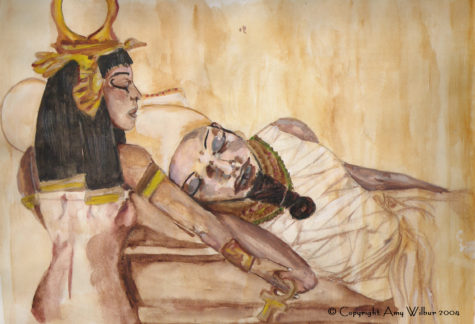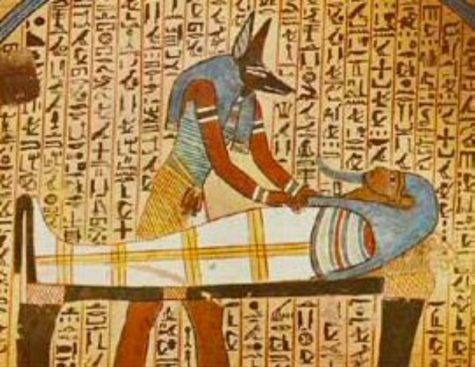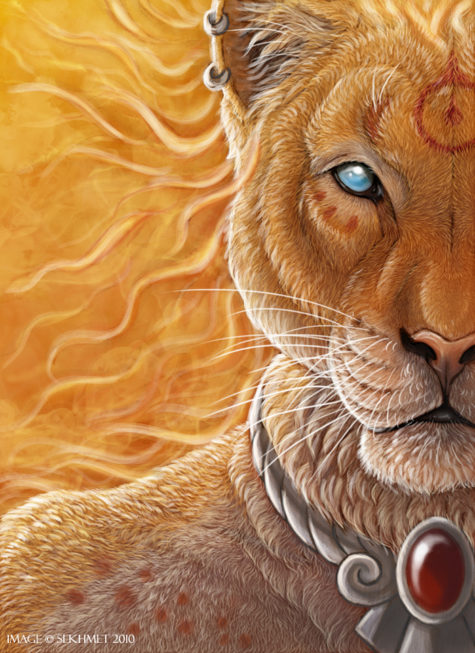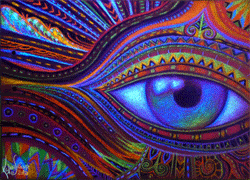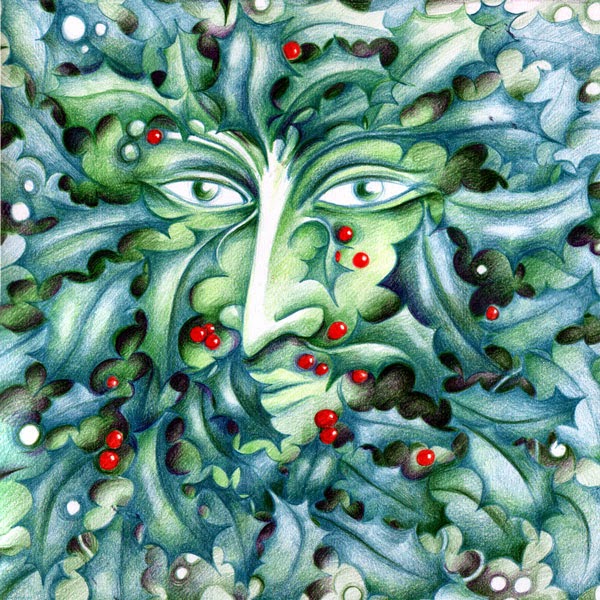Egyptian
Ra Takes The Form Of A Cat
There was a day when darkness gathered itself into a hungry snake and crawled upon the earth. On her belly she crept toward the city of light, swallowing whatever lay in her path: Men and women, beasts, vegetables and Gods. And no thing that touched her lips escaped her, for all matter was lost in the darkness.
That was the day, or rather the night, that Ra left the sky and took his shape in the cat. To fool the snake, he slept under the leathery leaves of the laurel, holding in his strength, stirring only once for a single languid lick of his paws to brush against his whiskers.
Seeing the cat ~ that tasty bit of flesh, the snake slithered over and opened its mouth. On the other side of her teeth swelled the void, the abyss, the great nothing, and from it issued the cries of all the lost things of creation. Their voices were a wailing wind that beckoned from the darkness.
Then the soul of Ra in the form of a tiny cat leapt up beneath the shade of the laurel and, with teeth of iron and gold, he snapped off the head of the snake and sliced its body into a thousand pieces and swallowed them up.
Blood from the snake’s mouth spilled onto the ground. In that manner Ra’s creations returned to earth. The blood seeped into the ground and was taken up by the thirsty laurel, which burst into bloom with the souls of the dead in the shape of yellow flowers.
Now leaning down from the east edge of heaven, the God of words had witnessed the battle. He had felt each puncture of the snake’s teeth upon his own throat and praised the cat which had given its shape to Ra.
“How like the God that made him is the radiant cat. How he slew the darkness with his mouth!” And Mau became the cat’s name and the God gave him words of power.
I have stood on the eastern bank beneath that flowering laurel ~ it is old now; its roots gnarled but still bursting with life ~ and I have gazed at the sky seeing daily the same battle. The sun rises. Light overcomes darkness and the high pink clouds of morning are tinged with the blood of the snake.
I am like that cat, overcoming my own darknesses. The soul duels fear and doubt and inertia, for these are the children of the snake, the worms hidden in the clay of being that would gnaw a man to death even while he lived.
I am that cat. I stand up and fight. I struggle with the evils of my own petty insistence. The battle of old Gods wages in my. I am a creature of history ~ human and divine. I am the scroll of numerous myths, one teller of a single story.
Now the sun rises as the gold egg of God, whole light of the world, saffron cake of being. Ra shines from his disk in heaven. He rises up ~ a golden wonder, a bead on the throat of sky. Gusts of wind issue forth as warm breath of his mouth and drive the boats along the water, sails the sun over a river of sky and enlivens the nostrils of his people.
He rises, making plain the two worlds of heaven and earth. I see myself by the light of my becoming.
~ From Awakening Osiris
The Old Man
Where there is a road an old man walks thinking, bent under the weight of his soul clinging like a child to his back. Ra spits his words into the dirt where they cover themselves and wait like seeds. The wheat will rise up singing.
The old man walks in circles beneath the circling sun. He makes a journey for himself from mewling infant to old man, old man to renewed God.
The snakes comes to take his heart, finding there the sun.
~From Awakening Osiris
Becoming The Phoenix
I flew straight out of heaven, a mad bird full of secrets. I came into being as I came into being. I grew as I grew. I changed as I change. My mind is fire, my soul fire. The cobra wakes and spits fire in my eyes.
I rise through ochre smoke into black air enclosed in a shower of stars. I am what I have made. I am the seed of every God, beautiful as evening, hard as light. I am the last four days of yesterday, four screams from the edges of the earth ~ beauty, terror, truth, madness ~ the phoenix on his pyre.
In a willow I made my nest of flowers and snakes, sandalwood and myrrh. I am waiting for eternity. I’m waiting for four hundred years to pass before I dance on flame, turn this desert to ash, before I rise, waking from gold and purple dreams into the season of God.
I will live forever in the fire spun from my own wings. I will suffer burns that burn to heal. I destroy and create myself like the sun that rises burning from the east and dies burning in the west.
To know the fire, I become the fire. I am power. I am light. I am forever. On earth and in heaven I am. This is my body, my work. This is my deliverance.
The heat of transformation is unbearable, yet change is necessary. it burns up the useless, the diseased. Time is a cool liquid, it flows away like a river. We shall see no end of it.
Generation after generation, I create myself. It is never easy. Long nights I waited, lost in myself considering the stars. I wage a battle against darkness, against my own ignorance, my resistance to change, my sentimental love for my own folly. Perfection is a difficult task.
I lose and find my way over again. One task done gives rise to others. There is no end to the work left to do. That is harsh eternity. There is no end to becoming. I live forever striving for perfection.
I praise the moment I die in fire for the veils of illusion burn with me. I see how hard we strive for truth, and once attained, how easily we forget it. I hold that fire as long as I can. My nose fills with the smell of seared flesh, the acrid smoke of death, so that years from now I might look on that scar and remember how it was to hold the light, how it was to die and come again radiant as light walking on sand.
I change and change again, generation after generation. I find anguish then peace.
I am satisfied with my birth and the fate to which it led me. I do not regret the discomforts and terrors of my mortality any more than I regret the company of angels. I have entered fire. I become invisible, yet I breathe in the flow of sun, in the eyes of children, in the light that animates the white cliffs at dawn.
I am the God in the world in everything, even in darkness. If you have not seen me there, you have not looked. I am the fire that burns you, that burns in you. To live is to die a thousand deaths, but there is only one fire, one eternity.
~From Awakening Osiris
Nephthys
What magnetic pull
we are drawn to at the end
of our light, the darkness
encircles us with her strength.
There is no escape
from the unknown expanse.
She brings you to the badlands.
She carries you to the dry barren
stretch of sky
where the stars too have been extinguished.
Hawks cry their parting love.
Women wail and she heeds
their pleas with unyielding love.
As all are born,
so too must they go.
into the dark expanse.
~Jeszika Le Vye
Hymn To The Sun
Shamash was the Sun God of ancient Babylon. The prayer that follows is one of the longest and most beautiful of the hymns that have come down to us in cuneiform. I think this would make an awesome invocation, prayer, or meditation to greet the Sun as morning dawns after the longest night of the year (The Winter Solstice).
Hail Shamash
You climb to the mountains surveying the earth,
You suspend from the heavens the circle of the lands.
You care for all the peoples of the lands,
And everything that Ea, king of the counselors, had created is entrusted to you.
Whatever has breath you shepherd without exception,
You are their keeper in upper and lower regions.
Regularly and without cease you traverse the heavens,
Every day you pass over the broad earth. . . .
Shepherd of that beneath, keeper of that above,
You, Shamash, direct, you are the light of everything.
You never fail to cross the wide expanse of sea,
The depth of which the Igigi know not.
Shamash, your glare reaches down to the abyss
So that monsters of the deep behold your light. . . .
Among all the Igigi there is none who toils but you,
None who is supreme like you in the whole pantheon of gods.
At your rising the gods of the land assemble,
Your fierce glare covers the land.
Of all the lands of varied speech,
You know their plans, you scan their way.
The whole of mankind bows to you,
Shamash, the universe longs for your light. . . .
Every single person is entrusted to your hands;
You manage their omens; that which is perplexing you make plain.
You observe, Shamash, prayer, supplication, and benediction,
Obeisance, kneeling, ritual murmurs, and prostration.
The feeble man calls you from the hollow of his mouth,
The humble, the weak, the afflicted, the poor,
She whose son is captive constantly and unceasingly confronts you.
He whose family is remote, whose city is distant,
The shepherd [amid) the terror of the steppe confronts you,
The herdsman in warfare, the keeper of sheep among enemies.
Shamash, there confronts you the caravan, those journeying in fear,
The travelling merchant, the agent who is carrying capital.
Shamash, there confronts you the fisherman with his net,
The hunter, the bowman who drives the game,
With his bird net the Fowler confronts You.
The prowling thief, the enemy of Shamash,
The marauder along the tracks of the steppe confronts you.
The roving dead, the vagrant soul,
They confront you, Shamash, and you hear all.
You do not obstruct those that confront you. . . .
For my sake, Shamash, do not curse them!
You grant revelations, Shamash, to the families of men,
Your harsh face and fierce light you give to them. . . .
The heavens are not enough as the vessel into which you gaze,
The sum of the lands is inadequate as a seer’s bowl…….
You deliver people surrounded by mighty waves,
In return you receive their pure, clear libations. . . .
They in their reverence laud the mention of you,
And worship your majesty for ever. . . .
Which are the mountains not clothed with your beams?
Which are the regions not warmed by the brightness of your light?
Brightener of gloom, illuminator of darkness,
Dispeller of darkness, illuminator of the broad earth.
Ishtar Visits The Underworld
Here is the story of Ishtar’s visit to the underworld that is written in a way that is much easier to read, and with a few minor alterations would be suitable for children too.
Ishtar was the Lady of the Gods, the Goddess of fertility. She had been unlucky in love. Her husband Tammuz, the great love of her youth, had died when he was still very young. She had fallen in love with Gilgamesh, that great king, but he had spurned her advances.
In Babylon, the dead were sent to the Underworld, a place of darkness ruled over by the Goddess Irkalla. It was said that in this place they lived on dust and mud. After being rejected by Gilgamesh, Ishtar became depressed and decided she would descend into the Underworld to be with Tammuz. So dressed in her finest garments, brilliant jewelry and her high crown, Ishtar entered the cave that leads into the Underworld. Irkalla’s realm was surrounded by seven walls, each with its own gate that had to be passed to get to the dark Place where the dead resided.
When she got to the first gate, Ishtar called out to the watchman: “Yo watchman, please open this gate and let me enter!” The watchman’s faced peered at her from over the gate. He didn’t say anything, but he didn’t open the gate either.
So she called out again: “Watchman, if you don’t open this gate for me I will force it open, I will break it down, and I will set free all the dead that reside in this dreadful dark place. I will set them free from their gloom and the rule of your merciless mistress and take them to the land of the living! The dead will be so plentiful on earth that they will take over from the living!”
Nedu, as the watchman was called, looked at this fine lady, her crowned head held high, in her splendid attire, and said: ”Please lady, don’t break down the gate. I will go and take your message to the Lady Irkalla. Please wait until I get back.”
When Irkalla heard that Ishtar demanded to be admitted to her realm, she was terribly angry. She thought she would teach this intruder a lesson, and instructed her watchman to admit the proud lady. Nedu returned to the first gate, and opened all the bolts and locks. “Enter into the realm of Irkalla, fine lady”, he said. “Welcome to the place from where nobody ever returns.” As he spoke, he took Ishtar’s crown. She wanted to know why he had taken her crown. “Oh lady,” he said, “if you wish to enter you must submit to the law of Lady Irkalla!” She bent her head and went through the first gate.
Ishtar walked the short distance to the second gate. The watchman opened all the bolts and locks, and said: “Enter into the realm of Irkalla, fine lady. Welcome to the place from where nobody ever returns.” As he spoke, he took the eight pointed star which adorned her neck. She wanted to know why he had taken her jewel. “Oh lady,” he said, “this is the law of Lady Irkalla!” She bent her head, her radiance gone, and went through the second gate.
Ishtar walked the short distance to the third gate. The watchman opened all the bolts and locks, and said: “Enter into the realm of Irkalla, fine lady. Welcome to the place from where nobody ever returns.” As he spoke, he took the gold and bejeweled bracelets from her wrists. She wanted to know why he had taken her bracelets. “Oh lady,” he said, “this is the law of Lady Irkalla!” She bent her head, her radiance gone, and without her magnificent gold ornaments, and went through the third gate.
Ishtar walked the short distance to the fourth gate. The watchman opened all the bolts and locks, and said: “Enter into the realm of Irkalla, fine lady. Welcome to the place from where nobody ever returns.” As he spoke, he took the shoes off her feet. She wanted to know why he had taken her shoes. “Oh lady,” he said, “this is the law of Lady Irkalla!” She bent her head, her radiance gone, and without her magnificent gold ornaments, barefooted she went through the fourth gate.
Ishtar walked the short distance to the fifth gate. The watchman opened all the bolts and locks, and said: “Enter into the realm of Irkalla, fine lady. Welcome to the place from where nobody ever returns.” As he spoke, he took the splendid veil that covered her face. She wanted to know why he had taken her veil. “Oh lady,” he said, “this is the law of Lady Irkalla!” She bent her head, her radiance gone, and without her magnificent gold ornaments, barefaced and barefooted she went through the fifth gate.
Ishtar walked the short distance to the sixth gate. The watchman opened all the bolts and locks, and said: “Enter into the realm of Irkalla, fine lady. Welcome to the place from where nobody ever returns.” As he spoke, he took her magnificent outer robe. She wanted to know why he had taken her outer robe. “Oh lady,” he said, “this is the law of Lady Irkalla!” She bent her head, her radiance gone, and without her magnificent gold ornaments, without the protection of her outer robe, barefaced and barefooted she went through the sixth gate.
Ishtar walked the short distance to the seventh gate. The watchman opened all the bolts and locks, and said: “Enter into the realm of Irkalla, fine lady. Welcome to the place from where nobody ever returns.” As he spoke, he took her dress. She wanted to know why he had taken her dress, leaving her quite naked. “Oh lady,” he said, “this is the law of Lady Irkalla!” And naked now, she bent her head, her radiance gone, and without her magnificent gold ornaments, without the protection of her outer robe, barefaced and barefooted she went through the seventh gate, where she found Irkalla.
Irkalla, the Queen of the Underworld had the head of a lioness and the body of a woman; in her arms she carried her pet, a deadly serpent. She summoned Belisari, the lady of the desert who was her scribe, and who came carrying the clay tablets on which all of Irkalla’s decrees would be written down. Behind these two the dead gathered. There was no light in their eyes; they were dressed not in cloth but feathers, and instead of arms and hands they had the wings of birds. They lived in darkness.
Ishtar became frightfully anxious seeing them, and she wished she had never ventured in this dark place. She had expected to find Tammuz here, but now she realized that this was a hopeless quest. Desperate, she begged Irkalla to allow her to return to the land of the living. Irkalla uttered a cold and contemptuous laugh and when she spoke it was as if an icy wind blew against Ishtar’s naked body.
Irkalla said: “Ishtar, you may be the Lady of the Gods, but you are in my realm now, and nobody returns from this place of darkness. This is called the House of Darkness for good reason, and whoever enters here, magistrate or warrior, king or shepherd, milkmaid or goddess, can never return.
Whoever enters this house has no more need of light. Dust will be your bread and mud will be your meat. Your dress will be a cloak of feathers. The gates are already bolted behind you, lady!”
Having said this, Irkalla summoned Namtar, the demon of the plague. Namtar appeared from the darkness, a viper’s head on a human body, naked underneath a cloak made of bones, and eagles claws instead of feet. He embraced Ishtar, making sure that the plague spread over her whole body. Feathers grew on her, and the light disappeared from her eyes. She tasted dust and ate mud. All memory of her past existence, of her great love Tammuz, disappeared with the light.
On earth a great change came when Ishtar descended into the Underworld. Love and desire became strangers to man and animal alike. Birds no longer sang. Bulls no longer searched out the cows. Stallions were no longer attracted to mares. Rams no longer cared for ewes. Wives no longer caressed their husbands when they returned from business or war. Husbands no longer longed to lie with their wives.
The women in Ishtar’s temple became lonely, nobody wanted to spend time drinking and singing and making merry with them. Shamash, the sun god, was deeply perturbed when he saw the changes that had befallen earth. He could foresee the disaster that awaited earth. Without procreation, without regeneration, there would be no life left on earth once the people and animals who were there now died off. The beings that the gods had created would all be extinct. He knew this was because of Ishtar’s descent into the Underworld, but he also knew that his power was not great enough to overcome Irkalla.
So Shamash went to see Ea, the great god, and told him that earth’s creatures were not renewing themselves. “How is this possible?” asked Ea. Shamash then related that Ishtar had descended to the Underworld, in search of Tammuz, and had not returned.
Ea then created a being he called Udushunamir, which he made devoid of all emotion or fear. With the power of all the gods, Ea sent him as an emissary to the Underworld court of Irkalla, where he would demand the water of life from the dark queen. Because Udushunamir had been created by Ea, the great god, Irkalla had no power over this creature, and could not stop it entering her realm. So Udushunamir entered the Underworld, and stood before Irkalla, where he demanded in the name of the great gods that Irkalla provide him with the water of life, and that Ishtar be brought from the darkness.
Of course Irkalla was furious at this demand. Her body trembled with rage as she roared and cursed both Ishtar and the emissary and all the gods everywhere, but to no avail. Udushunamir, being devoid of all emotion or fear, was unaffected either by the terrible sights in this dark place or by Irkalla’s curses. Irkalla could do nothing but submit, and she ordered the water of life be given to this creature, and so it was. She then summoned Namtar and ordered him to bring the Lady of the Gods from the Darkness.
Ishtar, covered in feathers and her feathers covered in dust, was brought before Udushunamir, who then liberally sprinkled the water of life all over her. The dust fell off Ishtar. The mud fell off Ishtar and the feathers and bird’s wings fell off her. She was alive again.
So she stood before her enemy, Irkalla, her head still bowed, colorless, weaker than a newborn human, just as naked and shaking like a leaf in the storm, but dead no longer. Udushunamir guided her through the darkness to the seventh gate, where Nadu the watchman handed her the dress he had taken from her earlier. She covered her nakedness with it.
She passed through the seventh gate and Udushunamir guided her to the sixth gate. The watchman opened it and gave her back her outer garment, which she put on over her dress.
She passed through the sixth gate and Udushunamir guided her to the fifth gate. The watchman opened it and he handed her back her splendid veil. She took the veil and covered her bare face, then passed though the fifth gate.
Udushunamir guided her to the fourth gate, where the watchman handed her back her shoes. She put them on her bare feet, and proceeded through the fourth gate. Udushunamir guided her to the third gate. The watchman opened it and handed her back her bejeweled bracelets. She took the bracelets and put them on her bare wrists.
She passed through the third gate and Udushunamir guided her to the second gate. The watchman opened it and gave her back the magnificent eight pointed star. Ishtar accepted the jewel and put it back on her neck. She walked through the second gate and Udushunamir guided her to the first gate. The watchman opened it and gave her back her high crown. She took it in her hands, and put it back on her head. Now Ishtar, her garments and ornaments reinstated, could leave the realm of Irkalla.
When she emerged from the cave, the earth was silent. There was no birdsong. No sounds came from the herds of cows and goats. No sailors’ songs came from the harbor. No music came from her temple. But as she walked from the cave her power returned, her neck straightened and her head bowed no longer, her splendor shone brilliantly and she walked as a goddess once more, a smile on her face.
The stallion bayed and the bull bellowed. The rams reared high. Soldiers and merchants alike made excuses to rush home to their wives’ fond embraces. The women in Ishtar’s temple picked up their instruments and sang beguiling words to the men passing by below. All of creation rejoiced in the return of Ishtar. And all the gods rejoiced too, knowing that their creations would renew themselves and would survive to honor and serve them.
Note:
There is more than one lesson to be learned from this myth.
Ishtar’s choice to journey from the Heavens to the Underworld is symbolic of her choice to turn her mind from conscious to the unconscious or from the “above” to the “below”.
Ishtar made this journey to the deepest part of her soul during a phase in her life that we would equate to a “midlife crisis”. This is the shamanic sacrifice of her very own persona so she could gain deep wisdom.
Afterwards the conscious and the unconscious are united and the goddess has a brand new identity. We humans must not fear giving up our symbols of worldly power when doing so provides us with spiritual initiation and rebirth of the soul.
Her death in the Underworld is also a metaphor for the death and rebirth experience.
Source: Soda Head
Ishtar – The Original Myth
At their first encounter, Ishtar is said to have fallen in love with the shepherd boy Tammuz who in turn asks for her hand in marriage. The Holy Marriage of Ishtar and Tammuz takes place and Tammuz is elevated to the god of fertility. As a result, their marriage endows the earth with fertility, and the cyclical renewal of life is ensured.
But a terrible day was to come when Ishtar would lose her lover, and would have to travel to the ends of the earth, and endure much pain and suffering, in order to bring him back.
The myth tells how Tammuz is killed, during the same month that bears his name. In the burning days of late summer the people came to the fields, where Tammuz stood, and cruelly murdered him with sickles scattering his flesh over the land. When the Goddess Ishtar learned of the death of her beloved, she was distraught with grief. Weary and worn from weeping she knew that she must find the spirit of Tammuz and bring him back to life, whatever perils faced her.
Ishtar finally descends to the netherworld to rescue Tammuz from “land of no return.” During these events in the netherworld , everything on earth is withering away. Trees and plants wither and die and animals and humans alike are sterile.
When Ishtar pleads with the Gods to restore Tammuz to life, the Gods agree, but to a partial reprieve only; whereby Tammuz spends six months in the world of the living and the following six months in the netherworld . Hence Tammuz is restored to life in the netherworld and together with his lover Ishtar they triumphantly return to earth on the first day of spring and the start of the New Year in Beth Nahrain.
Over the centuries as the myth was passed from generation to generation the love story was further elaborated. The expanded version of the myth explains how Ishtar’s husband Tammuz, who was also her son and her brother, came together with Ishtar in the world. She bore him, she made love with him and yet she remained a virgin.
After Tammuz was killed by a wild boar, Ishtar put ashes on her head and mourned for 40 days, giving up all pleasures and food. But then, she discovers that she is pregnant. She declares that it is a miraculous conception and in celebration of this miraculous pregnancy, this divine fertility, she has an egg of gold made, calling it the golden egg of Ishtar.
Ishtar searches for Tammuz all over the world. And finally finds him in the netherworld and eventually brings him back to life. Tammuz is resurrected and the vegetation again flourishes.
Source: Assyrian Voice
Words of Power For The Dead
In the Theban Recension of the Book of the Dead is found a Chapter which was composed for the purpose of bestowing upon the deceased some of the magical power of the goddess Isis. The Chapter was intended to be recited over an amulet called thet, made of carnelian, which had to be steeped in water of ankhami flowers, and set in a sycamore plinth, and if this were laid on the neck of a dead person it would place him under the protection of the words of power of Isis, and he would be able to go wheresoever he pleased in the Underworld.
The words of the Chapter were:
“Let the blood of Isis, and the magical powers (or spirits) of Isis, and the words of power of Isis, be mighty to protect and keep safely this great god (i.e., the deceased), and to guard him from him that would do unto him anything which he abominateth.”
Isis and Words of Power:
From a number of passages in the texts of various periods we learn that Isis possessed great skill in the working of magic, and several examples of the manner in which she employed it are well known.
Thus when she wished to make Ra reveal to her his greatest and most secret name, she made a venomous reptile out of dust mixed with the spittle of the god, and by uttering over it certain words of power she made it to bite Ra as he passed. When she had succeeded in obtaining from the god his most hidden name, which he only revealed because he was on the point of death, she uttered words which had the effect of driving the poison out of his limbs, and Ra recovered.
Now Isis not only used the words of power, but she also had knowledge of the way in which to pronounce them so that the beings or things to which they were addressed would be compelled to listen to them and, having listened, would be obliged to fulfill her bequests. The Egyptians believed that if the best effect was to be produced by words of power they must be uttered in a certain tone of voice, and at a certain rate, and at a certain time of the day or night, with appropriate gestures or ceremonies.
In the Hymn to Osiris it is said that Isis was well skilled in the use of words of power, and it was by means of these that she restored her husband to life, and obtained from him an heir. It is not known what the words were which she uttered on this occasion, but she appears to have obtained them from Thoth, the “lord of divine words,” and it was to him that she appealed for help to restore Horus to life after he had been stung to death by a scorpion.
From Gods of the Egyptians (1904)
Litany For The Dead
From The Papyrus of Ani, we have this Egyptian litany for the dead:
Homage to you, stars in Heliopolis, men and women in Kher-aha, god of existence, more glorious than the hidden gods in Heliopolis.
Homage to you, o moon-god Iwen in Iwen-des, great god, Harmachis travelling with long strides over heaven, he is Harmachis.
Homage to you, who is the soul of eternity, the soul in Busiris, Wen-nefer son of Nut, he is lord of the necropolis of Heliopolis.
Homage to you, in your kingdom of Busiris, the double crown remains on your head; you alone perform his protection; you rest in Busiris.
Homage to you, lord of the sycamore, placing the boat of Seker on its sledge, warding off demons who do evil, placing the Eye of Ra to rest on its seat.
Homage to you, who is mighty in his moment, most great one in the Place where Nothing Grows, lord of eternity, maker of infinity, you are lord of Herakleopolis.
Homage to you, who rests on truth, you are the lord of Abydos; your limbs are brought together in the Holy Land; you are he who loathes falsehood.
Homage to you, in his boat, bringing Hapi from his caverns. His light shines on his body; he is in Hierakonpolis.
Homage to you, maker of the gods, king of the South and North, Osiris, true of voice, founder of the Two Lands in his benevolent era; it is he who is lord of the banks of the Nile.
May you give me a way where I may pass in peace. I am judged true; I do not knowingly speak falsehoods, and I do not act doubly.
Sekhmet – Lady of Mysteries
I am the Dark Lady of the Egyptian Night, the goddess of Mystery
My signs are the lion, who walks proud and free, without fear
and the viper, who poisons those who displease it
I am offered meat and milk, for these two forms
And also blue lilies, for the dark skies of magic
I walk in the desert at night, and none know me
I stay in caves, and groups of rocks, and old trees
I know the pathways through the darkness on earth,
and I know the pathways beyond
Few have known my secrets, and they have been forgotten
with the moving of sands and of armies
But I still live, and hold the keys, and the passwords
To the worlds that appear after death
As the lion-goddess, I prey upon the unworthy
I am the wrath of the desert to the dishonest
I am the wrath of many gods, for I do not hesitate to act
And I have been involved in vengeance
I deserve to be feared
For my anger has gone forth upon the tomb-robbers and the killers of children
But for those who fear me, and speak with respect
I give knowledge of the many worlds of death
I am the Dark Guide, the secret way-finder, the one who leads through mazes
Some seek the worlds of the pharoahs,
those proud men bloated with their own importance
They now live in kingdoms which are echoes of their own worldly power
And they never change or grow
They paid their magicians well to make these worlds
As they paid their architects and sculptors to make monuments in the sand
They earned their money, and made afterlives of waters and date palms
But they stay there forever, without knowledge or love
Remembering their days of power
These are not worlds to visit
Where should one go in the after life?
This is the question
It depends on your ideals and your worthiness
One may be initiated during life, or after death to find the way
My worlds are those of dark beauty, the worlds of magicians, and explorers of the night
Not angry ghost and monsters, not the hell worlds
But places of clean pure air, filled with sorcery and wonder
Where one can feel the power and move it at will
Where the night air is your sculpture, and the stars your paint
Where each person can make a world of his own
Or, one may go to the worlds of Ra, the shining one
Whose rays are full of secret worlds
Ra whose boat travels the skies
Whose explosive power fills the skies with fireworks
Who shows the range of what already exists
Or we have the worlds of Isis
Lover, mourner, queen
It is Isis who both heals and steals, who is both truth and falsehood
Isis is the drama queen who plays the faithful wife
Yet takes power whenever she can get it
She is no great goddess who rules the sky
She is the trophy wife, desired by men and manipulating them
She can heal if she wishes but she may also lie about it
Osiris has the green worlds, and the death worlds
He is an ocean who absorbs all souls
To become Osiris is to lose your soul
I am the dark goddess who shows the way
Who strides like a lion in the darkness.
~Poetry from Crystal Rivers
James Cheney: Invocation To The Dark Mother
Daniel: Prayer Before The Final Battle
blessed obyno: Queen of Ghosts
blessed obyno: Queen of Ghosts
Caerlion Arthur: The Great, Bloody and Bruised Veil of the World
